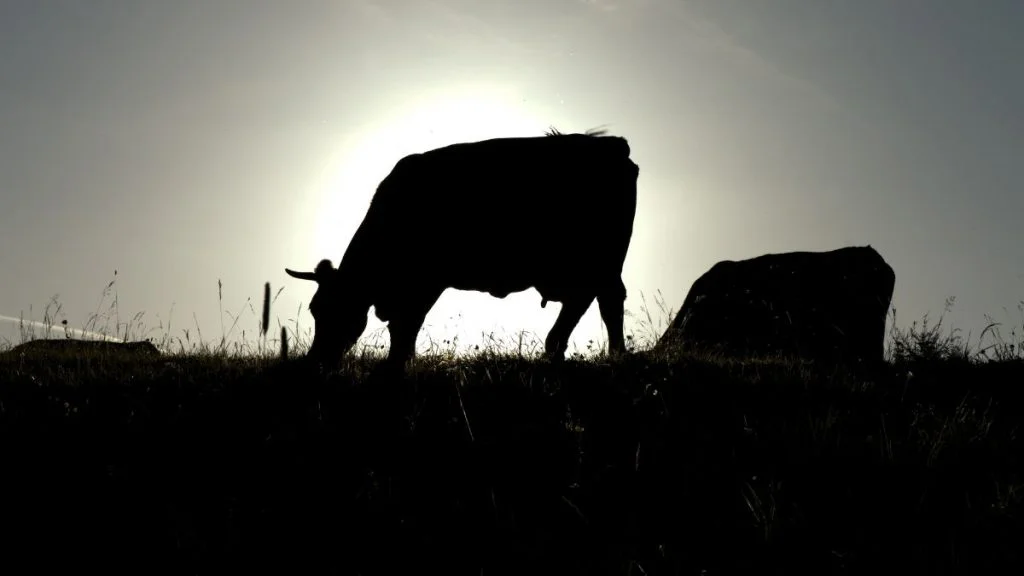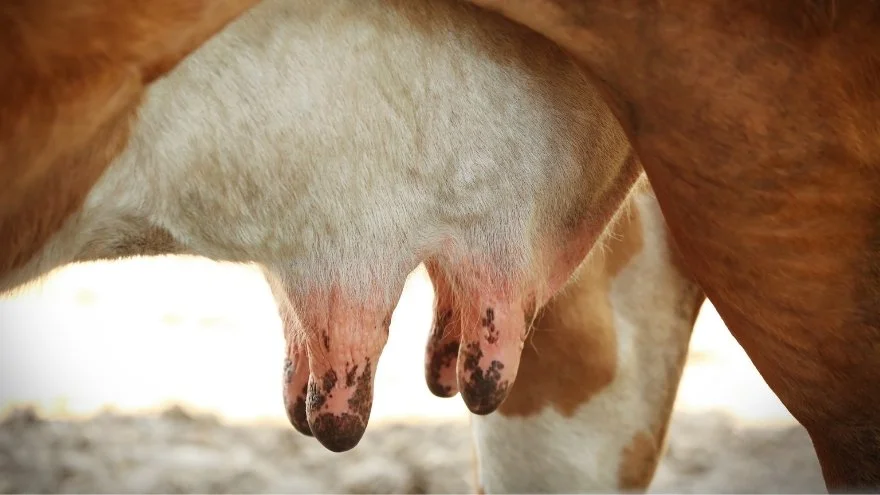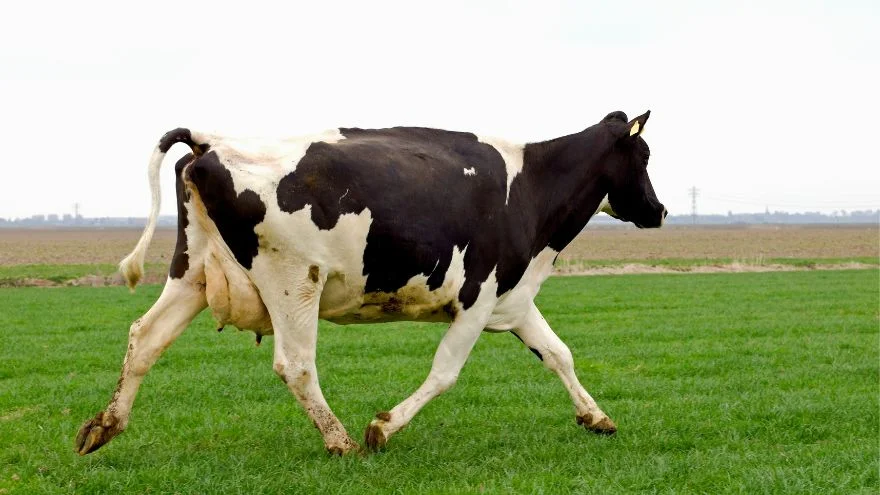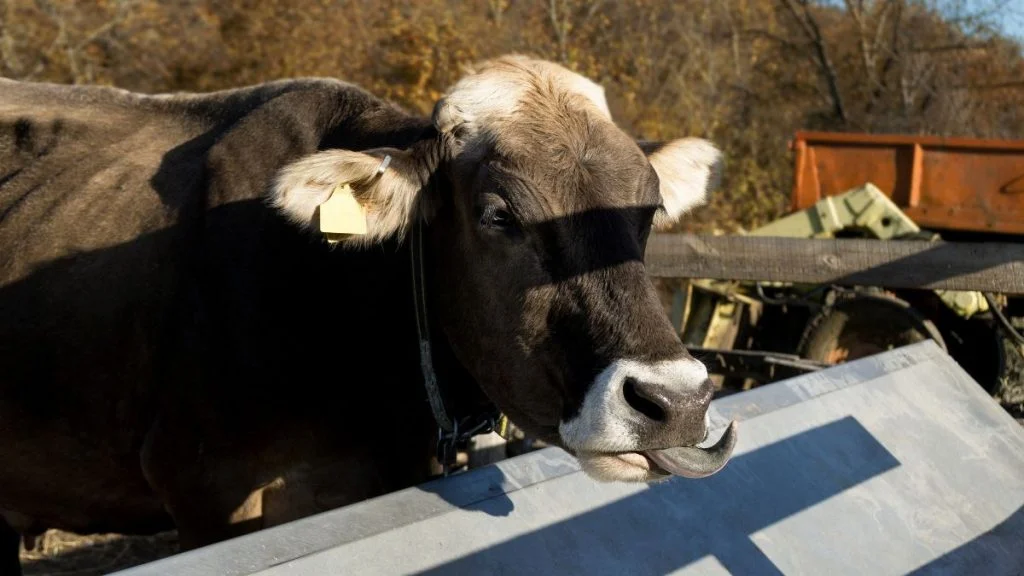Cows are diurnal by nature, which means they are more active during the day than at night.
However, if you’ve ever stayed on the farm (or watched a movie that was set in the countryside) you’d realize cows moo more at night.
They might also seem agitated and even move around a lot.
This makes us wonder if they share one of humanity’s common phobias: fear of the dark. Even more, can cows see in the dark?
Cows aren’t cats, nor are they nocturnal. Therefore, they can’t see completely in the dark. Cows do have stronger eyesight than humans, so they see better in dim-lit areas than we do.
They tend to be more cautious at night for many reasons, which explains the moos and signs of nervousness.
In the next paragraphs, read on to understand the relationship between cows and nighttime.
Can Cows See in the Dark?
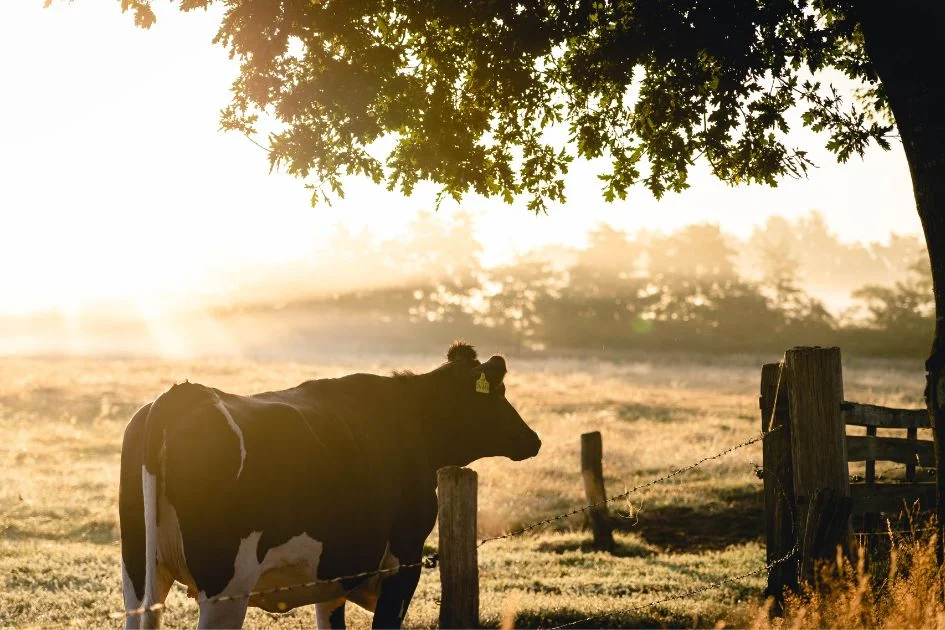
If you put a cow in a dark building, it won’t see. Cows are unable to completely see at night.
They need a little light in any dark area and prefer being close to the light. Once there’s light, it will see, even in areas that are impossible for humans to navigate.
This ability isn’t limited to some cow species. All cows can see in the dark when there’s a little light shining through.
By extension, every animal in the Bovidae family that cows are in can see in low-light areas. This includes antelopes, buffaloes, and bison.
How Do Cows See in the Dark?
Cows can adapt to an environment with low light because of their eye structure. It comes with a layer just behind the retina that’s absent in the human eyes.
The layer is called the tapetum lucidum (which translates as bright tapestry and coverlet).
Its job is to reflect light gotten from the retina back to it, thus making it easier for the animal to process light. The tapetum is in other animals like dogs, cats, and horses.
Thanks to this extra layer, cows can navigate areas with a limited amount of light, better than humans can. It is a natural gift for them.
Can Cows See at Night?
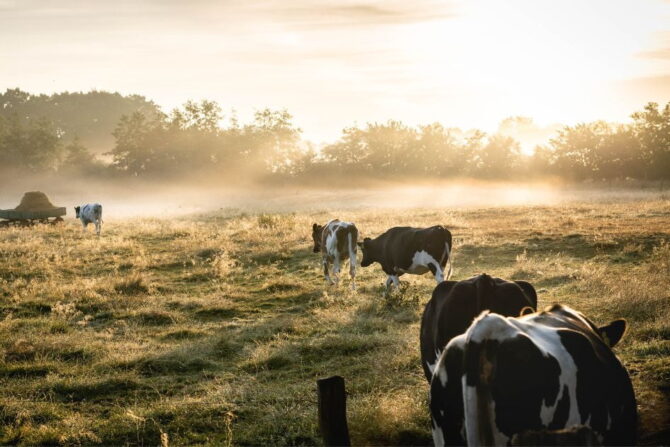
Thanks to the tapetum lucidum, cows can see at night, especially when the moon is out and there are stars.
Creators of the 2006 animated movie Barnyard surely did proper research before deciding that a cow become the guardian of the farm.
Compared to other farm animals, cows have this advantage.
It isn’t abnormal, then, to see your cows still grazing at night under the moonlight, even during moments when you’d need a torchlight to step out.
How Well Do Cows See at Night?
Cows see better during the day. Though they see well at night, it has its limits.
Cows see enough to eat, maintain their space, not cause any accidents and move around.
They also have what is called a panoramic vision, which enables them to see in all directions without having to turn.
However, because their sight is still limited at night, they use other ways to ensure all members of the herd are safe. That’s where mooing comes in, which we’ll still analyze.
Can Cows See Infrared?
Do note that though cows see better at night than humans, they can’t see in complete darkness.
Some animals like snakes can see in complete darkness using infrared vision, but no warm-blooded animal has this.
Infrared vision is used by bats, snakes, mosquitoes, bed bugs, and a few others. Cows are warm-blooded and can’t see infrared.
Do Cows Have Night Vision?
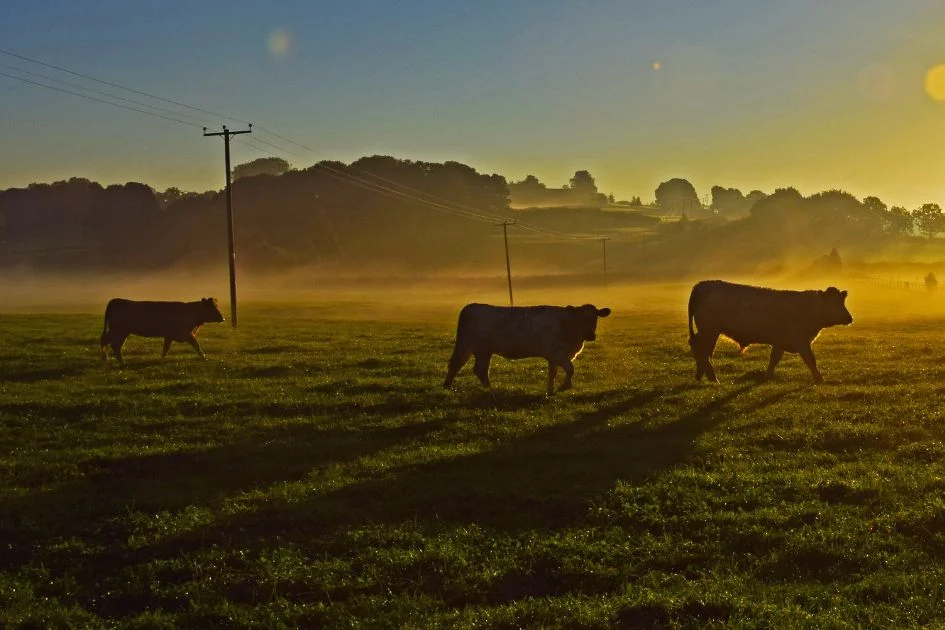
Because they can see better at night, cows can be said to have night vision.
Their eyesight can be compared to night vision technologies as there are some similarities in how they work.
Night vision technologies—such as the goggles—increase the low level to make the image clearer to the viewer.
Cow eyes use the tapetum lucidum to make images clearer. As such, they have night vision.
Do Cows Eyes Glow at Night (Eyeshine)?
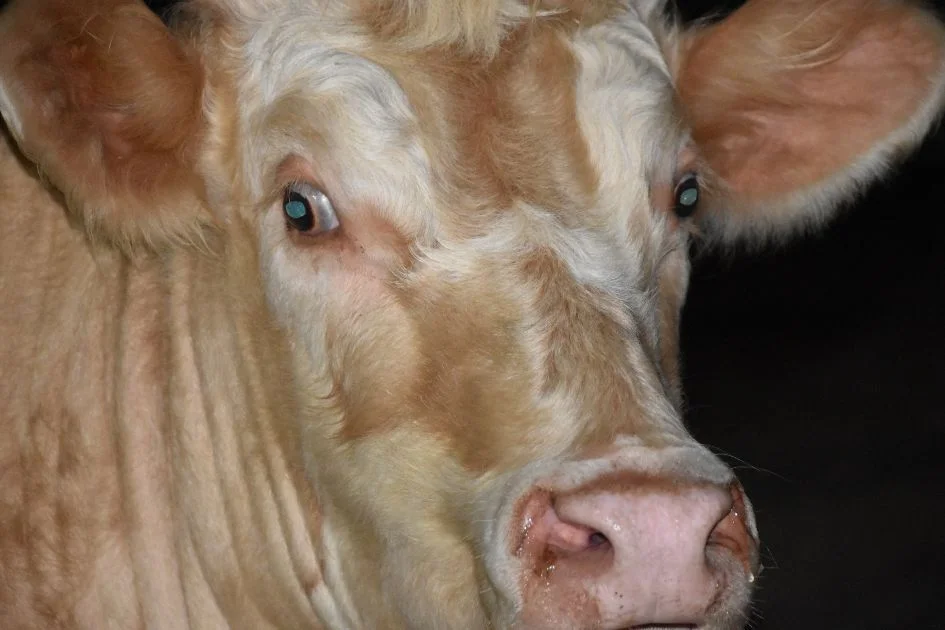
Cows have what is commonly called “eyeshine”, which means their eyes glow at night. This is thanks to the tapetum lucidum present in the eyes.
The glow isn’t exclusive to cows. As many cat owners know, cats’ eyes glow at night.
Deer, dogs, ferrets, and horses are some other animals with eyeshine.
Are Cows Afraid of the Dark?
According to studies done on cows’ preferences, it is safe to say that cows aren’t scared of the dark.
Results of these studies showed that—taking into account the weather and overall temperature—over 50% of cows preferred staying outdoors at night than in the barn.
That said, cows are herbivorous prey to many predators, and because they see better in the morning than at night, they are always on alert.
No cow wants to be dinner for coyotes and other wild animals that live close to farms. This is a major reason they moo at night.
Why Do Cows Moo at Night?
Cows don’t just moo to disturb sleeping humans. They do so primarily as a form of protection.
Besides that, mooing is also their form of socialization. We’ll look into this in detail:
Raise an alarm to warn of a potential danger
Cows often look out for other members of the herd as they are social animals.
Because they are prey animals, they move together in groups to keep themselves safe. Once one senses any danger, it moos to alert others and ensure their safety.
A softer sound shows everything is okay. A higher-pitched moo, however, is the cow’s equivalent of a red flag. Cows are smarter than we give them credit for.
Find their herd mates, mother, or calf
As social animals, being alone puts the cow at risk. A cow that’s isolated from its herd will use moos to find them.
Interestingly, cows have specific moos for friends, just as we use names to identify people. Calves can also detect the sound of their mother calling, and vice versa.
This bond between cows is something rarely seen amongst animals and does show how often we underrate them.
Show excitement or emotions
A cow can also moo when it finds green pasture for them to feed on.
Because they can’t see at night as well as they do in the morning, each one is responsible for informing others when good pasture is found.
Cows are good examples of teamwork amongst animals.
Form of communication
Overall, mooing is a form of communication and socialization that’s essential for cows.
Cows have families, friends, and even best friends that they relate with. Mooing is a tool they use to hold their friendships together.
Why Do Cows Need to See at Night?
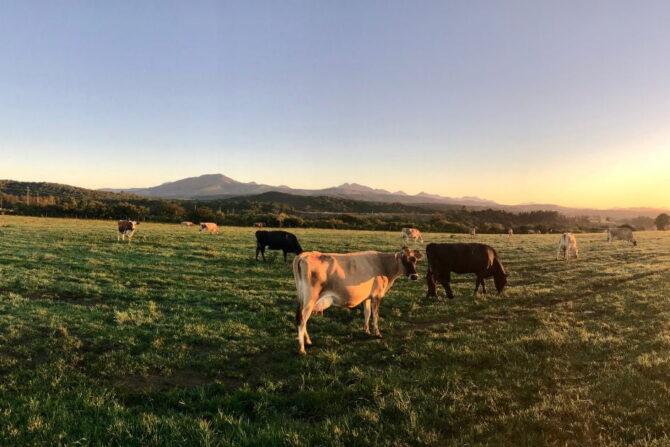
The answer to this ties down to the subsequent section. There are two main reasons cows need the ability to see at night: finding food and looking out for predators.
Without the ability to see at night, cows would be unable to forage.
They often sleep four hours a day, and though they are not considered nocturnal, they possibly enjoy the cool night and find it a good time to stay outdoors.
Of course, the risk of predators is high at night, so cows need the ability to see in the dark.
Other Animals that can See in the Night
Besides cows, there are a couple of other animals that see at night. A lot of these animals are nocturnal, and they have different sights.
Here’s a list of animals that can see at the night:
- Snakes (snakes can be nocturnal, diurnal, or crepuscular depending on several factors.)
- Bats
- Lizards
- Birds of prey
- Cats
- Dogs
Related Questions
Why do cows moo at humans?
Cows sometimes moo at humans, and they do so for various reasons. It could be that they haven’t been milked in a while and are feeling uncomfortable.
They could also be feeling stressed, angry, and cold (or hot). You should figure out what it is trying to communicate and respond effectively.
How do I know when a cow is afraid?
Just like humans, cows show visible signs of fear, stress, and duress. They do this by bellowing, kicking, or butting. The tail is another indication of what’s going on in the cow’s mind.
Do cows need light at night?
Cows see better during the day. While they can see at night, it would be impossible for them to do so without light. Cows can’t see in complete darkness, but when there’s a little light they can adapt.
Do cows stay outside at night?
According to research, cows generally prefer staying outside at night, especially when the weather is cool enough for it. They’d want to eat and sleep under the moonlight and stars.
How do I stop my cow from mooing at night?
Cows may never completely stop mooing at night, but you can minimize the rate at which they do by keeping plenty of food and water around, ensuring they are not isolated from each other, and protecting the area they’re in from potential predators.
You should also take care of injured or sick ones.
Is Cow mooing at night a bad omen?
There’s a superstition surrounding cows, one that has persisted for years. According to the myth, cows moo at night when death or something bad is about to happen.
However, the only bad thing that can occur when cows moo is predators attacking.
Final Thoughts
Once again, we reiterate that cows are smarter and more skillful than we give them credit for.
Their ability to see better than humans under dim light is but one of the many interesting qualities of these animals.
Because their eyes reflect low light levels, cows can see at night as long as there’s a little amount of light from sources like the moon and the stars.
We can learn how to look out for our peers from cows, as they do that constantly.
You may also like:
Featured Image Credit: GeorgHanf/Getty Images Signature
